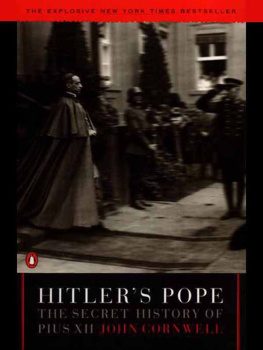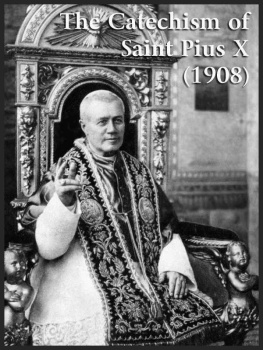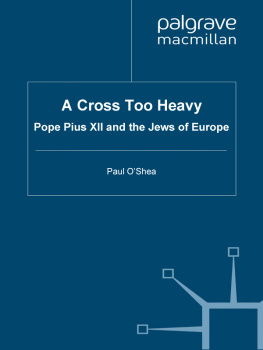Robin Anderson - St. Pius V: His Life, Times, Virtues and Miracles
Here you can read online Robin Anderson - St. Pius V: His Life, Times, Virtues and Miracles full text of the book (entire story) in english for free. Download pdf and epub, get meaning, cover and reviews about this ebook. year: 2016, publisher: TAN Books, genre: Non-fiction. Description of the work, (preface) as well as reviews are available. Best literature library LitArk.com created for fans of good reading and offers a wide selection of genres:
Romance novel
Science fiction
Adventure
Detective
Science
History
Home and family
Prose
Art
Politics
Computer
Non-fiction
Religion
Business
Children
Humor
Choose a favorite category and find really read worthwhile books. Enjoy immersion in the world of imagination, feel the emotions of the characters or learn something new for yourself, make an fascinating discovery.

- Book:St. Pius V: His Life, Times, Virtues and Miracles
- Author:
- Publisher:TAN Books
- Genre:
- Year:2016
- Rating:4 / 5
- Favourites:Add to favourites
- Your mark:
- 80
- 1
- 2
- 3
- 4
- 5
St. Pius V: His Life, Times, Virtues and Miracles: summary, description and annotation
We offer to read an annotation, description, summary or preface (depends on what the author of the book "St. Pius V: His Life, Times, Virtues and Miracles" wrote himself). If you haven't found the necessary information about the book — write in the comments, we will try to find it.
St. Pius V: His Life, Times, Virtues and Miracles — read online for free the complete book (whole text) full work
Below is the text of the book, divided by pages. System saving the place of the last page read, allows you to conveniently read the book "St. Pius V: His Life, Times, Virtues and Miracles" online for free, without having to search again every time where you left off. Put a bookmark, and you can go to the page where you finished reading at any time.
Font size:
Interval:
Bookmark:
ST. PIUS V
A Brief Account of His
Life, Times, Virtues and Miracles
By
Robin Anderson
Foreword by
Alfredo Cardinal Ottaviani
Copyright 1978 by Robin Anderson.
Originally published in 1973 by St. Michael's Press. Republished in 1978 by TAN Books and Publishers, Inc. Retypeset and republished again in 1989 by TAN Books and Publishers, Inc. Typography is the property of TAN Books and Publishers, Inc., and may not be reproduced, in whole or in part, without written permission of the publisher.
Library of Congress Catalog Card Number: 88-51510
ISBN: 0-89555-354-6
The photo on the front cover is of the statue of Pope St. Pius V by Leonardo da Sarzana located in the Sistine Chapel of St. Mary Major's Basilica in Rome.
TAN Books
Charlotte, North Carolina
www.TANBooks.com
1989
OTHER WORKS BY THE AUTHOR
Rome Churches for English-Speaking People
The Quiet GraveIntimate Journals
Between Two WarsThe Life of Pius XI
Gleams of English-Language Literature
Pope Pius VIIHis Life, Times, and
Struggle with Napoleon in the
Aftermath of the French Revolution
PRAYER TO ST. PIUS V
from the Dominican Liturgy
O St. Pius V, admirable Pastor, remember thy flock! Before the Supreme Judge of all, come to the aid of thy faithful! Who can better intercede for us? For none labored more intensely to further God's glory on earth.
CONTENTS
SOME PRINCIPAL DATES
IN THE LIFE OF ST. PIUS V
1504 | Birth |
1518 | Enters Dominican College |
1521 | Religious Profession |
1528 | Ordination |
1545 | Opening of Council of Trent |
1546 | Appointed Inquisitor at Como |
1550 | Inquisitor General |
1556 | Bishop of Nepi and Sutri (under Paul IV) |
1557 | Created Cardinal with title of S. Maria Sopra Minerva |
1558 | Inquisitor General of Christendom |
1560 | Bishop of Mondovi (under Pius IV) |
1563 | Closing of the Council of Trent |
1566 | Elected Pope |
1566 | Catechism of the Council of Trent |
1568 | The Roman BreviaryQuod a nobis |
1570 | The Roman MissalQuo primum tempore |
1570 | Excommunication of ElizabethRegnans in excelsis |
1571 | Signing of the Triple Holy Alliance against the Turks |
1571 | The Battle of Lepanto |
1572 | Death (May 1) |
1588 | Mortal remains transferred from St. Peter's Basilica to St. Mary Major's |
1672 | Beatification by Clement X |
1712 | Canonization by Clement XI |
1904 | Repositioning and reclothing of the sacred remains |
FOREWORD
This book by Prof. Anderson does something truly opportune and praiseworthy in giving an account of the virtues and merits of St. Pius V, great saint, glorious defender of Christian standards, valiant guardian of the treasures of truth, justice and sanctity which the Church was born to spread throughout the world.
And this is all the more opportune in our age when materialism, Communism, humanism and atheism "convenerunt in unum adversus Dominum et adversus Christum ejus."
God's mysterious designs were revealed in a singular way when Michael Ghislieri, withdrawn from the particular and limited duties of a local apostolate, was elected to the Throne of the Supreme Pontificate.
Rome, the Church, the entire world needed a man of the temper, holiness and energetic action such as were proper to him.
Mohammedanism threatened a devastating storm, but Providence raised up the man who might be the worthy and fitting instrument to subdue it.
Lepanto gave Christendom no mere passing victory of restricted range and importance; it was the mainspring of the recovery that freed the Christian world from a disastrous reverse and enabled the Church to carry on her evangelizing mission with security.
And in this regard it should indeed be clearly shown how the Supreme Pontificate was then, and always will be, the effective bulwark of salvation.
I wrote once, and wish to repeat today, this indisputable judgment on the mission of papal Rome: "All sorrow, disaster, darkness or persecution are nothing when we have the certainty that among men there is, and will ever be, a man in whom the light of everlasting truth can never fail. The night of the world is dark for us, but never starless: there is the Pope." And such a light was St. Pius V.
Rome, March 21, 1973
 A. Card. OTTAVIANI
A. Card. OTTAVIANI
Chapter 1
FROM SHEPHERD BOY TO POPE
Michael Ghislieri was born in the township of Bosco, not far from the Piedmontese city of Alesandria, on January 17, 1504, during the reign of Pope Julius II. He was at first called Anthony, but later took the name of Michael, Prince of the Heavenly Hosts, whom he chose as patron. His parents were peasants of deeply Christian faith.
As a boy, he had a special love for the Mother of God and wished to consecrate himself to God's service. His mother encouraged him prudently, telling him to pray to Our Lady. When he was twelve years old, this desire became the certainty that he had a vocation to be a priest. His people were too poor, however, to afford him studies and set him to mind the flocks of sheep.
According to some accounts, a chance meeting with two Dominican Fathers in the fields decided his entry into religion: struck by the boy's piety and intelligence, the Friars suggested his studying Latin with them and trying his vocation. There are also contemporary references to a gentleman of the neighborhood sending him to the Dominicans for schooling, together with his son. His progress was anyway so remarkable that after two years, with his parents' consent, he was allowed to take the habit of the order.
He was professed the following year, then sent to Bologna University, where he obtained the requisite degrees and was appointed professor of philosophy for the province when only twenty years old. As well as having a gift for imparting knowledge, he was able to instill a love of supernatural virtue, more by example than by eloquence. Of his theological teaching it was said he "mingled the thorns of Calvary with those of learning," leading his pupils to the foot of the Cross.
Ordained at twenty-four in 1528, he was to say his first Mass, by the wish of his Provincial, in the parish church of his birthplace. He arrived to find it burnt down, his home half destroyed, and the church desecrated by imperial troops. Rome had been occupied and sacked the previous year, and Pope Clement VII was still the Emperor Charles V's prisoner in Castel St. Angelo. He said his first Mass in Sezze, where his parents had taken refuge.
Four times elected Prior, although he would have refused the responsibility had it been possible to do so without going against the will of God, he never dispensed himself from the least observance of the Rule. Tired out from his teaching work, he practiced additional mortifications to keep himself from becoming vain over the success he had with his students. His government was gentle, but severe; and the open or veiled dislike aroused in some by his sternness caused him acute suffering. His health was not always good, but his stall was never empty during Divine Office in choir, for which he was punctual to the minute. Never leaving the monastery himself except on necessary business, he would not allow the younger monks to go outside the enclosure. "Salt when thrown into water becomes indistinguishable from it," he said, "and religious, by God's grace the salt of the earth, easily absorb the spirit of the world when unnecessarily in contact with it."
Next pageFont size:
Interval:
Bookmark:
Similar books «St. Pius V: His Life, Times, Virtues and Miracles»
Look at similar books to St. Pius V: His Life, Times, Virtues and Miracles. We have selected literature similar in name and meaning in the hope of providing readers with more options to find new, interesting, not yet read works.
Discussion, reviews of the book St. Pius V: His Life, Times, Virtues and Miracles and just readers' own opinions. Leave your comments, write what you think about the work, its meaning or the main characters. Specify what exactly you liked and what you didn't like, and why you think so.







